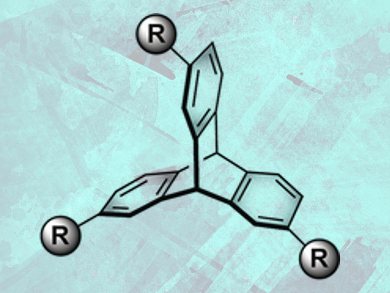The heat shock response (HSR) allows for cell survival in response to environmental changes, including temperature. In Escherichia coli bacteria, the σ32 protein plays an essential role in regulating the HSR.
David M. Chenoweth and colleagues, University of Pennsylvania, Philadelphia, USA, have developed small molecules that modulate the σ32 mRNA temperature sensor, which is critical for the synthesis of σ32. The σ32 mRNA contains an important three-way junction (3WJ) near two regulatory elements. Chenoweth’s group has previously found that triptycene-based small molecules bind to 3WJs.
The researchers used UV thermal melting, circular dichroism, and fluorescence-quenching experiments to examine the interactions between triptycenes and the σ32 mRNA. These triptycenes thermally stabilized a model system that contains the critical 3WJ as well as the full 5′ region of the mRNA.
To demonstrate in vivo modulation, the researchers developed a reporter assay that allows for monitoring the levels of σ32 in E. coli. Their results demonstrated a decrease in the translation of σ32 in the presence of triptycenes at higher temperatures. The researchers concluded that these small molecules could provide important tools to study the E. coli HSR pathway and may result in a new class of potential antimicrobial agents.
- Modulation of the E.coli rpoH Temperature Sensor with Triptycene-Based Small Molecules,
Stephanie A. Barros, Ina Yoon, David M. Chenoweth,
Angew. Chem. Int. Ed. 2016, 55, 8258–8261.
DOI: 10.1002/anie.201601626




